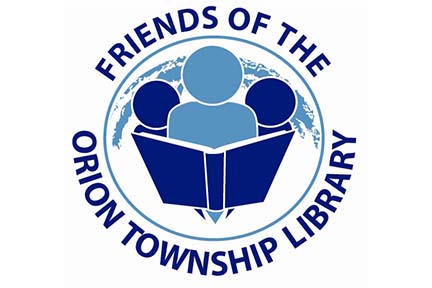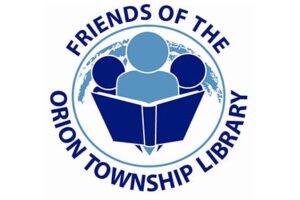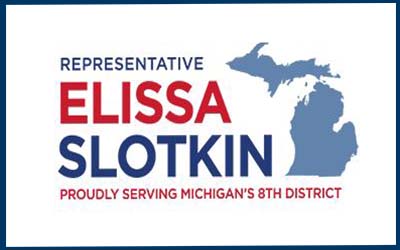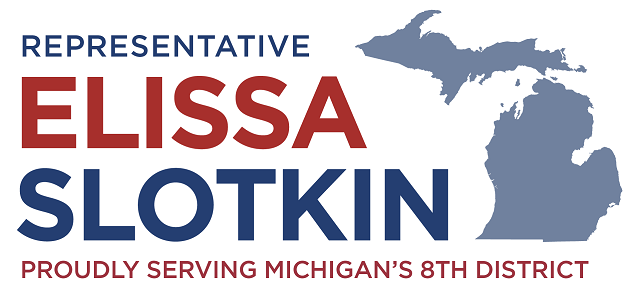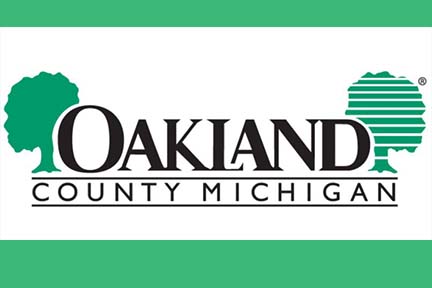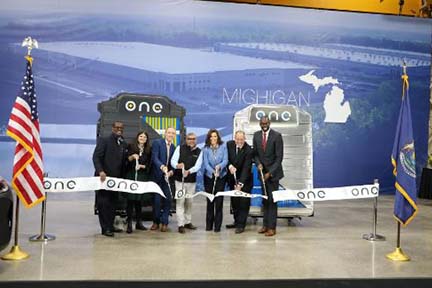
Whitmer Cuts Ribbon at Our Next Energy’s New HQ in Novi

FOR IMMEDIATE RELEASE October 20, 2022 Contact: press@michigan.gov
Gov. Whitmer Cuts Ribbon at Our Next Energy’s New HQ in Novi Cutting-edge battery maker Our Next Energy continues investing in Michigan, builds on their recent $1.6 billion plant in Van Buren Township creating 2,112 jobs
LANSING, Mich. – Today, Governor Gretchen Whitmer joined Our Next Energy (ONE) and federal, state, and local leaders to highlight the company’s strong growth and historic investments in southeast Michigan. The event included a ribbon-cutting ceremony and tour of ONE’s new global headquarters in Novi, where the company is developing products to be manufactured at ONE Circle, their forthcoming, $1.6 billion battery manufacturing campus in Van Buren Township that will create 2,112 jobs. Governor Whitmer helped announce ONE Circle earlier this month.
“ONE is a Michigan-born-and-raised company on the cutting-edge of mobility and electrification. I was proud to join them today to open their new global headquarters in Novi and celebrate their historic, forthcoming $1.6 billion investment to build a gigafactory in Van Buren Township, creating 2,112 jobs,” said Governor Gretchen Whitmer. “The decision by this innovative company to keep its headquarters in Novi and establish a new manufacturing plant in Wayne County shows the world that Michigan is the place to build the future. I am proud that leaders on both sides of the aisle came together to secure this project and bring the supply chain home from China to Michigan. Let’s keep working together to grow our economy, create good-paying jobs, and build the future of the auto industry right here in Michigan.”
“Michigan is, and always has been, a home for innovators of all kinds to discover and develop new technologies that will lead to a better future – ONE’s growth and investment in Michigan continues this great tradition,” said Quentin L. Messer, Jr., CEO of the MEDC and President and Chair of the MSF Board. “We are thrilled to welcome this additional investment by ONE as the company makes it clear that Michigan’s highly skilled workforce and mobility ecosystem provide the winning combination for its continued growth into the next generation and beyond. Through the steadfast support of our bipartisan legislative partners, the Whitmer-Gilchrist Administration and our many local partners, we are continuing to demonstrate that Michigan is a place for pure opportunity.”
Our Next Energy (ONE) is an energy storage company founded with the mission to double the distance electric vehicles can travel using safer, more sustainable materials. Founded in 2020, ONE uses safe, sustainable, low-cost battery chemistries for consumer and commercial electric vehicles, in addition to developing technology for stationary storage – particularly around utility-scale energy storage systems. ONE is dedicated to the long-term vision of achieving vertical integration for American energy storage manufacturing by working to develop a robust and resilient domestic supply chain for critical minerals.
The new headquarters is home to ONE’s business operations and engineering teams. Corporate functions including supply chain, procurement, IT, finance, and HR will also be operated out of the campus. The lobby of the building houses a collection of electric vehicle historical artifacts, where the origins of electrification in Detroit can be explored by guests.
“Michigan offers an exceptional talent pool and ideal location to collaborate with customers and suppliers as we advance towards US based cell manufacturing,” said Mujeeb Ijaz, founder and CEO of ONE. “Our Novi headquarters play a critical role in building our future here in Michigan.”
The new facility enhances ONE’s product development and validation capabilities by co-locating cell, battery pack, battery management systems (BMS), manufacturing and administrative functions in one place, allowing for fully vertically integrated product development.
Announced earlier in October, the ONE Circle factory will be ONE’s first cell and EV battery pack Gigafactory. ONE is partnering with Ashley Capital to locate this inaugural factory in the Crossroads Distribution Center, where it will establish a state-of-the-art 659,589 square foot facility in Van Buren Charter Township, Wayne County. ONE will use a newly developed cell factory model in this project with an emphasis on developing a North American raw material supply chain and a co-located material refinement strategy. The campus plans to scale to 20 GWh capacity within five years, and will include raw material refinement, cathode materials production, as well as cell and battery manufacturing.
This gigafactory battery cell manufacturing campus will create 2,112 good-paying jobs and generate $1.6 billion in capital investment. The gigafactory will further have a generational impact in terms of workforce development, economic impact and tax revenue.
“Our Next Energy’s battery cell manufacturing campus strengthens Southeast Michigan’s role as a leader in the next generation of automotive technology,” Oakland County Executive Dave Coulter said. “Investing in electric vehicles, autonomous driving, and connected cars will help us maintain our title as the automotive capital of the world.”
Michigan was chosen for the project over competing sites in the United States and Canada. The project will bring highly skilled engineering, manufacturing, and operations jobs for Michiganders, including those in disadvantaged regions of the state. The company is partnering with Focus: HOPE to develop a training program that will provide skills-based training for its employee base modeled after established certification programs.
“We are very excited that ONE chose to site its new factory in Van Buren Township,” said Jerry Norcia, DTE Energy Chairman and CEO. “ONE’s goal to achieve a 45 percent reduction in carbon emissions by 2028 in partnership with DTE Energy and others is well aligned with our net zero carbon emission journey. The entire DTE team congratulates ONE on this ambitious project.”
The company’s investment will create a significantly bigger impact on the state’s overall economy than just the direct new jobs created. It is expected that 3.3 jobs will be created for every new direct job this project is creating. In addition, the project will result in significant job creation and capital investment. It is anticipated the influx of jobs will result in spin-off investments and redevelopment opportunities. More than $13 billion in new personal income is expected to be generated by the direct, indirect, and induced jobs that this project will create over 20 years.
Local Community Voices Support for ONE Headquarters in Michigan:
“The future of Michigan’s economy depends on America’s ability to compete in the global transition to electric vehicles, and Our Next Energy’s $1.6 billion investment in battery manufacturing will secure our place as the global leader in electrification,” said Rep. Haley Stevens (MI-11). “This historic achievement would not be possible without the hard work of Governor Gretchen Whitmer and Lt. Governor Garlin Gilchrist, state government, local communities, and Our Next Energy, who came together to spur economic development and create 2,112 good-paying jobs in the heartland of the industrial Midwest. It is an honor to be here today as Michigan takes this leap toward a safer, more affordable, and cleaner mobility future.”
“Michigan put the world on wheels, and today demonstrated that our state is leading the way in building the batteries that will drive our nation’s transition to electric vehicles,” said Congresswoman Debbie Dingell (MI-12). “Our Next Energy’s new facilities will ultimately create over 2,100 new jobs here in our communities, and I look forward to continuing to work with Governor Whitmer to invest in hard-working Michiganders and American innovation.”
“Betting on Michigan is always a winning strategy,” said Rep. Kelly Breen (D-Novi). “Creating good paying and green energy jobs puts Michigan at the forefront of manufacturing for the 21st century. We are keeping our promise to bring jobs to Michigan and get the economy working for middle-class Michiganders. Our Next Energy is investing $1.6 billion in Michigan and when all is said and done more than $13 billion in new personal income is expected to be generated by this project over the next 20 years.”
“This project builds on many decades of talent and infrastructure investments by our great state and local communities,” said Detroit Region Aerotropolis Development Corporation CEO Christopher Girdwood.
“Wayne County is the center of the nation’s automotive industry and the development of electric vehicles. This iconic investment in the new battery plant demonstrates why we’re also the preferred location for companies who wish to drive the automotive supply chain of the future.” said Warren C. Evans, Wayne County Executive.
“The Detroit Region continues to serve as the global epicenter for mobility innovation,” said Maureen Donohue Krauss, president and CEO of the Detroit Regional Partnership. “Up and down the supply chain, from startups to mid-size companies to Fortune 500 OEMs, the Detroit Region is home to pioneers like Our Next Energy who continue to push the envelope on cutting-edge battery, EV and advanced mobility technologies. We congratulate ONE on their tremendous growth and applaud all the partners who helped secure this project for our region.”
“Novi is a dynamic community on many fronts, from a magnet to businesses around the globe to being a sought after, welcoming, diverse neighborhood that more than 65,000 residents call home,” said City of Novi Mayor Bob Gatt. “It provides great excitement to watch one of our own have the opportunity to expand right here in Michigan and I couldn’t be happier for Our Next Energy. Once again, Novi shines as leader in the business world as the host of their headquarters and to watch their vision and factory come to fruition in Wayne County shows how our community and the state work as a team, support one another and work together for the betterment of all.”
“We are very excited about the selection of Van Buren Township as the site for ONE’s manufacturing facility. We fully embrace this type of industry that is committed to developing clean and sustainable energy solutions for the future.” said Van Buren Township Supervisor Kevin McNamara. “Van Buren Township is a perfect landing spot for this kind of innovative economic development given our talented workforce and strategic location.”
|









